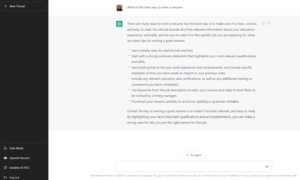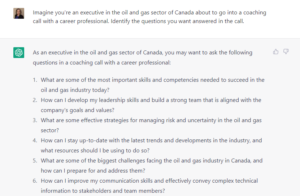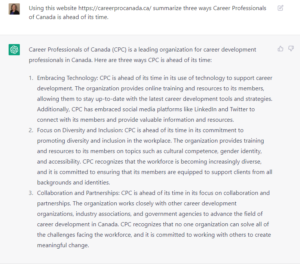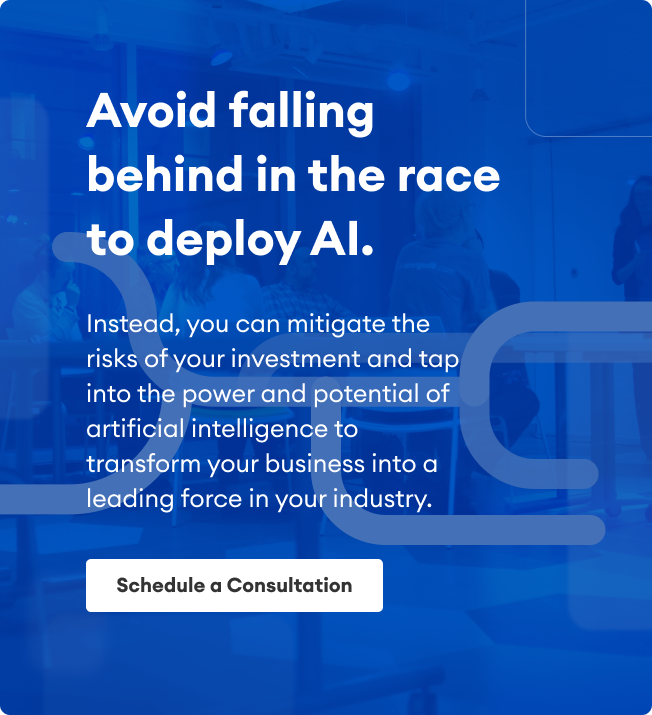Artificial Intelligence, or AI, is one of the most exciting developments in modern times, and it’s poised to change the way we work forever. For career professionals, that may feel scary and confusing. One of the biggest fears among career professionals is that AI may replace them. While it’s true that AI has the potential to automate routine tasks and, in many instances, provide better services, it’s important to approach the use of AI with a balanced perspective and see the opportunities to build upon its strengths. In this blog, we’ll explore how AI can help career professionals up their game, the challenges they might face, and how they can leverage AI to provide the best services to their clients. We’ll also point to some funding that is available to help you get an AI strategy in place for your private practice or your company.
This Time it Really is Different
Have you heard about ChatGPT? It is an incredible new interactive chatbot; so popular, it was on the cover of Time magazine. No technology has ever been adopted by the public so quickly. Without any promotion, it went from zero users to over 100 million users in just a few weeks.
If you have not tried it, you should.
How smart is it? It produced content that was good enough to pass a medical licensing exam, a Wharton MBA course, and a Canadian citizenship test.
How could this be? For so long, we’ve been hearing about AI being an emergent technology. And the truth is that artificial intelligence has followed what’s known as Moore’s Law — doubling its capability every year or so. However, our brains are not good at appreciating this exponential rate of change.
Take this example; if each of my strides is 1 metre long, after 30 strides I’ve travelled 30 metres. But if the length of my strides keeps doubling (1m, 2m, 4m, 8m…), by the time I get to my 30th step, I’ve travelled over 1 billion metres, or 27 times around the earth.
In other words, AI capabilities have been doubling for years. It is only in 2023 that those doublings were big enough for most of us to notice. Of course, this means that in 2024 and beyond, the rate of change is going to seem even faster.
What Does This Mean for Career Professionals?
It is only natural for career professionals to feel concerned about what this change will mean for them.
One thing is certain — more and more of the work career professionals currently do will be done by AI-enabled tools.
Take résumé writing and Teal (which is powered using the same AI as ChatGPT). Job seekers can upload an existing résumé, or import their LinkedIn profile to a free online résumé builder. Then they use various templates to create ATS-compliant résumés, which can be personalized.
Is the result as good as advice from a trained and skilled career professional? Absolutely not, but it can be done quickly and at a fraction of the cost. And these tools are only going to be better and cheaper as companies get more data from users.
So how do career professionals continue to provide value to their clients? The answer is that you will need to think about services that cannot be easily replicated by artificial intelligence, such as creativity, unique experiences, and highly personalized services. When anyone can get a custom résumé matched to a job poster in two minutes or less, these human-centred services will be more valuable.
Making AI a Tool for You
Career professionals can benefit from leveraging AI as a powerful tool to enhance their services and unlock new opportunities.
Here are a few tips for using ChatGPT.
At the most basic level, you can give it instructions to write something for you, like a letter to a client, or an agenda for a meeting. Here is Maureen’s first-ever ChatGPT example from last year. She asked, “What is the best way to write a résumé?”
You can agree or disagree with the answer the technology produced. If you’ve never seen AI or ChatGPT work its magic, to stand back and watch it create this answer in mere seconds was amazing!

Think for a moment how this might help you create your business marketing materials, training manuals, social media posts, courses, and your client programs!
Try it for yourself.
Visit ChatGPT. Sign up for an account and (usually), within moments, you’ll be able to ask it anything!
You may be gobsmacked by how good it is when you first use it, but with practice, you’ll see it becomes formulaic. The quality of work is what you might expect from a junior employee. Being fast and free, it is a typically a good first draft, but you’ll need to polish it.
A more advanced use case is to ask it to assume the identity of someone who matches the profile of your client, and enter into a conversation. Ask ChatGPT (in the role of your client) what questions or concerns come to mind, what they’re afraid of, or how you might be able to help. This allows you to engage in scenario planning even before you meet your client, and perhaps find opportunities to provide value that you had not imagined.
In February 2023, Maureen asked ChatGPT, “Imagine you’re an executive in the oil and gas sector of Canada about to go into a coaching call with a career professional. Identify the questions you want answered in the call.”

Imagine how you can use this tool to prepare for client meetings; and not just client meetings, but any meeting — even those with government funders!
Once you’re comfortable with scenario planning, you could invite your client to also use ChatGPT. You might suggest your client ask ChatGPT to assume the role of a career professional. “Talking” with ChatGPT might help them prepare for your meeting.
And ChatGPT is only one type of AI-enabled tool that is emerging.
We mentioned Teal above, but others include Traitify for talent assessment, and Textio to analyze the language and tone of job postings.
Beyond those tailored to the career development profession, AI can help your business grow. For example, if you have a business with many manuals and repetitive tasks, there can be a good business case for teaching a bot to do that work, which would free up employees for other more valuable activities.
In short, you can think of AI as augmenting your capabilities. Working with AI, you can accomplish things that neither you, nor the AI, would be able to do alone.
WARNING! Be Mindful of the Risks
While AI-powered tools can provide many benefits for career professionals, it’s important to be aware of the potential risks and take steps to mitigate them.
For instance, ChatGPT is trained to give persuasive responses, but this does not mean that the answers are true. Sometimes it simply makes up information. This is known as “hallucination.” Therefore, before you rely on anything from ChatGPT, you’ll want to be sure it is accurate and appropriate.
Second, you should never share personal client information with ChatGPT. Any information you share should be anonymized, as there is not yet a way to ensure that personal information is protected.
Where to Start?
It can be intimidating to try and determine where to start with artificial intelligence and other digital technologies.
The good news is that there is a government program that provides assistance to small and medium sized businesses. It is called the Digital Adoption Program.
The “Boost Your Business Technology Grant” is for businesses with revenue between $500k and $100 million. This provides a grant of up to $15,000 to prepare a Digital Adoption Strategy with an independent Digital Advisor. Before you make any investments in digital technology, you get a strategy and implementation roadmap in place. Then, if it makes sense to invest, you are eligible for up to $100k interest free to finance the implementation. (Full disclosure: one of the authors, John Stroud, is a Digital Advisor under this program, but there are hundreds of other options you can choose from).
If you don’t have $500k in revenue, there is a micro grant of $2,400 to help with the costs of adopting digital technologies for such things as getting online, increasing sales, or connecting with customers.
Conclusion
While it may feel like AI is travelling at warp speed and you’re already lagging behind — you’re not. CPC is ahead of its time by ensuring its members are well-educated about this innovative technology.

Is it perfect? No. There are pros and cons to its use, but it is coming and it will change the way we work. Much like we educate our clients to stay current in their industries using Labour Market Information (LMI), we, too, must continue our learning and adapt to the ways of the future because “resistance is futile.” (Wait! who put that quote there?)
Continue to assess, evaluate, and explore the many benefits of AI. Use your critical thinking skills and skepticism to ask good questions and assess both the strengths and weaknesses of this new technology before you decide to “jump on the bandwagon.”
If you’ve been around for a few years, you may remember when LinkedIn (2006) popped up and many were resistant to incorporate it into our clients’ job search activities. At the time, Maureen co-presented at Cannexus with fellow-CPC Member Wayne Pagani. Their presentation asked the question, “What’s the ROI on LinkedIn?”
Let’s do the same here. What is the benefit of using AI in our practices, with our clients, and in our businesses? What’s the cost should we choose to ignore it?
As career professionals, one of our most important roles is to help our clients become more effective in job search. So, how can we talk to our clients about integrating AI into the process of finding satisfying work?
John Stroud is the co-founder of A.I. Guides, and provides strategic advice on the best fit artificial intelligence applications for your firm. People turn to John for plainspoken, easy-to-understand explanations. He is a certified OpenExO consultant in exponential technologies, and prior to launching AI Guides, John served as Vice President, Strategy at a major federal crown corporation. He holds a law degree, a Masters of Philosophy, a Masters of Public Administration, and his ICD.D for completing the Director’s Education Program at the Institute of Corporate Directors.
Portions of this article include content modified from text generated by AI.


